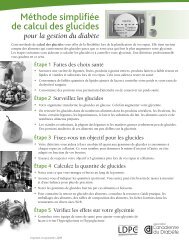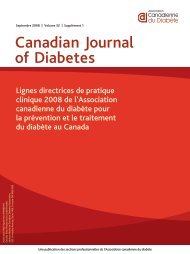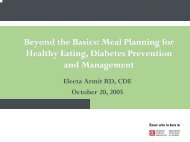2008 Clinical Practice Guidelines - Canadian Diabetes Association
2008 Clinical Practice Guidelines - Canadian Diabetes Association
2008 Clinical Practice Guidelines - Canadian Diabetes Association
You also want an ePaper? Increase the reach of your titles
YUMPU automatically turns print PDFs into web optimized ePapers that Google loves.
<strong>2008</strong> CLINICAL PRACTICE GUIDELINES<br />
S72<br />
nutrition, dextrose infusions should be provided.<br />
To maintain effective blood levels of insulin, short- or<br />
rapid-acting insulin should be administered 30 minutes to 2<br />
hours before discontinuation of IV insulin infusion.The initial<br />
dose of subcutaneous insulin given after discontinuation<br />
of IV insulin infusion should be based on previously established<br />
dose requirements or the rate and pattern of inhospital<br />
IV insulin infusion. Other parameters that affect<br />
subcutaneous insulin dose determination include body<br />
weight, stress of illness and other comorbid conditions such<br />
as renal insufficiency.<br />
ORGANIZATION OF CARE<br />
Healthcare institutions should implement a program to<br />
improve glycemic control in the inpatient setting.This should<br />
include the formation of a multidisciplinary steering committee<br />
to provide educational programs, implement policies<br />
to assess and monitor the quality of glycemic management,<br />
and produce standardized order sets, protocols and algorithms<br />
for diabetes care within the institution. The timely<br />
consultation of such teams has been demonstrated to<br />
improve quality, reduce length of stay and lower costs (8,9).<br />
Self-management in the hospital may be appropriate for<br />
competent adult patients who successfully conduct selfmanagement<br />
of diabetes at home, have a stable level of consciousness,<br />
and have the physical skills needed to self-administer<br />
insulin and perform self-monitoring of blood glucose<br />
(SMBG). A physician order for self-management should be<br />
written with respect to selection of food, SMBG, self-determination<br />
and administration of insulin dose and type.<br />
Bedside BG monitoring<br />
No study has compared the effect of frequency of bedside BG<br />
testing on the incidence of hyper- or hypoglycemia in the<br />
hospital. The frequency and timing of bedside BG monitoring<br />
should be individualized. Healthcare institutions must<br />
implement and maintain a quality-control program to ensure<br />
the accuracy of bedside BG testing (10,11).<br />
Safety – hypoglycemia<br />
Hypoglycemia remains a major impediment to achieving<br />
optimal glycemic control in hospitalized patients. Healthcare<br />
institutions should have standardized treatment protocols<br />
that address mild, moderate and severe hypoglycemia.<br />
Healthcare workers should be educated about factors that<br />
increase the risk of hypoglycemia, such as sudden reduction<br />
in oral intake or discontinuation of enteral or parenteral<br />
nutrition, unexpected transfer from nursing unit after rapidacting<br />
insulin administration, and reduction in corticosteroid<br />
dose (12).<br />
Safety – insulin administration errors<br />
Insulin is identified as 1 of the top 5 “high-risk medications”<br />
in the hospital setting. A systems approach may work to<br />
reduce errors. This includes preprinted, approved, unambiguous<br />
standard orders for insulin administration, or<br />
computerized order entry (13).<br />
THE CRITICALLY ILL PATIENT<br />
Acute hyperglycemia in the intensive care setting is not<br />
unusual and results from a number of factors, including<br />
stress-induced counterregulatory hormone secretion, and<br />
possibly the effect of medications administered in the<br />
intensive care unit (ICU) (14). Hyperglycemia in this setting<br />
has effects on multiple systems, including the CV, neurologic<br />
and immune systems (14). Van den Berghe and<br />
colleagues (15) demonstrated impressive benefits of intensive<br />
glycemic control with IV insulin infusion among predominantly<br />
surgical patients admitted to the ICU and<br />
requiring mechanical ventilation. A subsequent analysis of<br />
a heterogeneous ICU population with predominantly medical<br />
patients and utilizing historical controls demonstrated<br />
a reduction in mortality, length of stay, renal dysfunction<br />
and requirement of transfusion among those receiving<br />
intensive glycemic control with an IV insulin infusion protocol<br />
(16).<br />
A meta-analysis of studies looking at the effects of insulin<br />
therapy for critically ill adult patients also demonstrated an<br />
overall reduction in mortality, particularly among those with<br />
diabetes and if glycemic control was a primary goal (17).<br />
However, this meta-analysis did not include any randomized<br />
controlled trials (RCTs) of intensive insulin therapy in a<br />
medical ICU.To date, there has been only 1 RCT of intensive<br />
insulin therapy and glycemic control among medical ICU<br />
patients (18). There was no difference in the primary outcome<br />
of in-hospital mortality between the groups. However,<br />
there was a significant reduction in the prespecified secondary<br />
outcomes of renal dysfunction, length of stay and prolonged<br />
mechanical ventilation. Mortality was increased<br />
among patients who stayed in the ICU for 3 days.<br />
Perioperative glycemic control<br />
The management of individuals with diabetes at the time of<br />
surgery poses a number of challenges. Acute hyperglycemia<br />
is common secondary to the physiologic stress associated<br />
with surgery. Pre-existing diabetes-related complications<br />
and comorbidities may also influence clinical outcomes.<br />
Acute hyperglycemia has been shown to adversely affect<br />
immune function (19) and wound healing (20) in animal<br />
models. Observational studies in humans have shown that<br />
hyperglycemia increases the risk of postoperative infections<br />
(21-23) and renal allograft rejection (24), and is associated<br />
with increased resource utilization (25).<br />
In patients undergoing coronary artery bypass surgery, a<br />
pre-existing diagnosis of diabetes has been identified as a risk<br />
factor for postoperative sternal wound infections, delirium,<br />
renal dysfunction, respiratory insufficiency and prolonged











